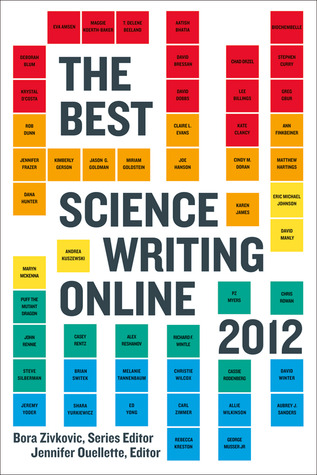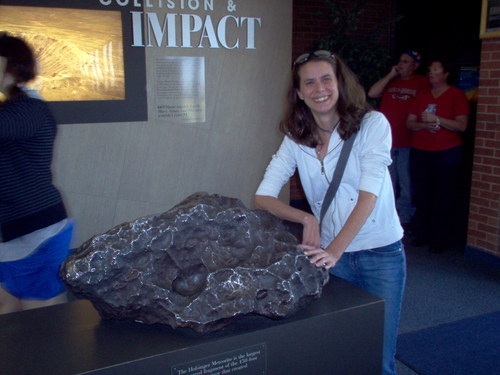Many moons ago, I was pleased to discover that one of my posts had been selected for inclusion in the latest iteration of the OpenLab anthology of online science writing. Also included from the Geoblogosphere was one of its most prolific and exciting voices of recent years: Dana Hunter, who now flies the Earth Science flag over at the Scientific American blog network, and whose piece describing the process of falling in scientific love with geology really resonated with me. I am, I admit, a bit of a fan.
OpenLab is now out, and in order to promote it we decided we might conduct a mutual interview of each other about our pieces, our lives and our love of geology. Dana’s interview of me was published some time ago, but time and jobs and moving and conferences and Christmas all got in the way of me returning the favour. But believe me, it’s well worth the wait: Dana’s enthusiasm for things geological is rather cheeringly infectious.
Chris: One of the fascinating things about your account of getting bitten by the geology bug – and one of the reasons your essay is, well, adored – is how similar it is to my story, and the stories of many academic and professional geologists. The only significant difference is your starting point as someone who left science education behind early, whereas we are usually refugees from other scientific fields. Do you think that, in another life, you could have ended up as a scientist? In some nearby alternate reality, is there a hammer-wielding Dana who runs her own lab?
Dana: Yes, absolutely. And I envy her. Well, on nice days, anyway. During nasty weather, I’m usually pleased I stuck with writing, although I’ve begun to rethink that aversion just lately.
I wanted to be an astronomer, once. I suppose that qualifies me as a something of a fellow refugee!
Chris: Well, we have that in common, then, since my original scientific ambitions lay with astronomy too. On a related note, it sounds like it was more your interest in literature and the humanities that led you to dropping science, rather than an uninspiring syllabus or boring teachers. Is that right?
Dana: Honestly, I didn’t think I had the brain for science. My math education got derailed in middle school, and never got back on the rails, and I thought that meant I wasn’t a science sort of person. I didn’t know that there were fields where the math wasn’t quite as difficult. And by the time I hit chemistry in high school and discovered I could, in fact, do the math, it was too late – I’d decided to become a speculative fiction writer, and all of my thought was bent on that. Then PZ started me on writing about science, and then the geo bug bit me, and the geobloggers adopted me, and now I find I’ve dropped the fiction from science fiction. Some days, I even eye the possibility of getting a degree and changing my title from science writer to geologist – but right now, I’m loving what I do.
One thing I wish my teachers had done: told us just how varied the careers in science are, and that creative people can be scientists, too! That might have changed everything from the beginning.
Chris: Especially since it’s the creative scientists – the ones who are willing to push the boundaries of current thinking and dream up new experiments and techniques – who are the most successful of all of us.
In the past few months you have written a fabulous series of in-depth posts on the Mt St. Helens eruption. What makes this event so interesting for you?
Dana: St. Helens was my first introduction to what volcanoes can do, and it was unbelievably dramatic. I got Marian T. Place’s book on the eruption a few years later, and learned a huge amount of geology – I re-read it when I started this series and was surprised by how much complex volcanology she introduced her young readers to. Well, that stuck. And the people she wrote about, like Dave Johnston and Reid Blackburn and David Crockett, they stuck. I’d look at the stratovolcano in my back yard and think of St. Helens. I got jewellery made from her ash. Every time she came up, something new and unexpected revealed itself.
She was in eruption when I finally met her. I looked into her steaming crater, and a lifelong fascination pretty much became an obsession. I wanted to know absolutely everything about her. That turns out to be much more than I expected! And we haven’t even gotten to the 2004-2007 eruption yet, which is a series of papers at least as in-depth as the ones I’m working through now.
Just like the Grand Canyon taught me about deep time, Mount St. Helens taught me about the power of mother nature to create and destroy, sometimes in an instant, sometimes more slowly than we can imagine. And people adore her. That makes her an excellent ambassador for the earth sciences.
Chris: As well as stratovolcanoes, you’re clearly fascinated by subduction zones, partly as a result of now living on top of one. Are there any other aspects of Earth Science that particularly fascinate you?
Dana: It depends on which shiny new paper I’ve got my hands on this week. Seriously, just about anything to do with geology captures my imagination. I’ve done (and will return to) caves and karst landscapes – karst has been one of my favorites since learning about it in college. Tafoni weathering fascinates me because we know so little – if I ever go for my degree, I might just do my thesis on it. I’m dying to know more about earthquakes, because my ignorance regarding them is a great gaping hole begging to be filled. I love glaciers and ice sheets and the bizarre things they do to landscapes. Your coblogger, Anne, has gotten me in to hydrogeology – I just downloaded a paper about ancient Chinese hydrogeology and plan to do a write-up for her (shh, don’t tell her!). Geology on other planets and asteroids, and bits of said exo-geology falling to earth and creating features here, is captivating. Basically, if it’s earth science, I’m interested. I want to know how worlds work, from silt to solar systems.
Chris: a kid in a scientific candy shop then, just like the rest of us! Nonetheless, you have a fairly unique perspective on geoblogging and other attempts to engage with the public using online and social media tools. Are there any areas/subjects where you feel the community should perhaps focus more effort, either because they are explained badly, or because they are very poorly known and understood?
Dana: Earthquakes, for one – people come up to me all the time with misconceptions about earthquakes. I love what you do, because you explain so clearly what we know and what we don’t, how earthquakes work, and I think we need more of that. Especially in light of what happened in Italy.
I think we need to make people more aware of how they’re surrounded by geology, and how it’s incorporated into their daily lives. People don’t realize geology has anything to do with their smartphones – but those rare earth elements have to be mined, and mining is geology. Hazards are geology. Beautiful recreation areas – geology. Evolution – geology. Our survival and our civilizations depend on geology. Geology has so much to do with just about everything, yet people are so busy staring at physics or biology that they forget geology exists, and it matters, and they need to be aware of it. Especially here in Seattle, I see the consequences daily of people not understanding geology. Because they don’t, they end up building their houses on bluffs underlain by the Lawton Clay, and then become mightily surprised when the stuff on top of the Lawton Clay slides off during periods of particularly heavy precipitation, taking their beautiful houses with it. Yet geologists knew all along it was bound to happen.
There’s beauty, and there’s utility, and I’d like to see people become much more aware of both while having pernicious myths busted. The only way that’s going to happen is if we’re loud and proud and persistent. Snark, humor, and a heaping helping of sheer awe help. So does letting people know about the beer. I have discovered a sudden increase of interest in our field every time I mention the beer…
Chris: Well, beer is important. Understanding about earthquakes is important too, and I’m hoping to be a bit more regular with the earthquake blogging, particularly Friday Focal Mechanisms, this year. Your passion for rocks shines out of that last answer: do you think that your growing knowledge of geoscience has started to infect your daily life? Symptoms include: spending more time looking at the ground than the view when in the mountains, being an extremely dangerous driver near roadcuts, and having to move rocks around to access your bookshelves. Sadly, there’s no known cure…
Dana: I knew it was a systemic infection when I, a certified bibliophile, started sacrificing books in order to create shelf space for rocks. I will drive miles to loop back to a particularly good road cut, and have only just prevented myself from parking behind construction vehicles and marching up to demand a look at cuts in progress. When I look at vistas, it’s only to get the context of the stuff under my feet. One of my coworkers spent an afternoon sending me lovely landscape photos, and I was too busy identifying the geology in them (and finding it outstanding good fun to be able to identify so many places by their geology alone) to comment on their value as vacation spots. Many of my dreams involve field trips. I itch to correct fantasy maps, and figure out if they may have a plausible plate tectonic history. The first thing I see in pictures is rocks, even if they’re off to the side and out of focus. I miss major plot points in movies because I’m busy trying to unravel the geology in the scene. It has gotten so bad that I see geologic features in my Greek yogurt.
And I don’t ever want there to be a cure. I love this disease.
Chris: Let’s set out to infect more people, then! Thanks Dana.

The OpenLab anthology. It’s really very good.




Comments (3)